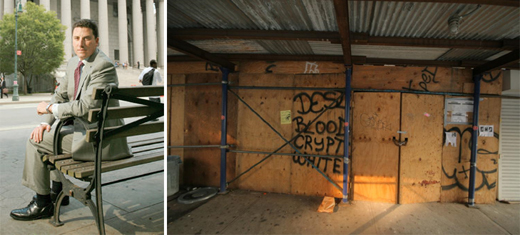At least one of the projects on the city’s list of stalled development sites may soon be changing hands.
Chinatrust Bank has named Eastern Consolidated as the exclusive broker in the sale of two non-performing commercial mortgages, at 75 First Avenue in Manhattan and 333 Fairmont Avenue in Jersey City.
Originally slated to become residential condominiums, 75 First Avenue is now listed by the Department of Buildings as one of nearly 400 stalled construction sites in New York City.
Foreclosure proceedings have commenced on both properties, according to David Schechtman, a senior director at Eastern Consolidated, who is handling the sale along with senior director Ety Lee.
Located between 4th and 5th streets, 75 First Avenue is a vacant 24-by-100-foot lot with amassed air rights, Schechtman said. The site, which contains 31,230 square feet of zoning floor area, was previously occupied by a now-demolished four-story commercial building.
The owner is Anthony Marano, who purchased 75 First Avenue for $3.7 million in 2005, according to city data. A former associate broker at the Corcoran Group, Marano is the founder of Ozymandius Realty, a real estate brokerage and the developer of projects such as 50 Bond Street and 87 Leonard Street, according to his company’s Web site.
The $21 million loan on 75 First Avenue has an unpaid balance of $7.5 million, and was 122 days past due as of June 1. Chinatrust filed to foreclose on the property in New York County Supreme Court June 23, court documents show.
Marano was not immediately available for comment.
Other stalled development sites identified by the city include Five Franklin Place and 56 Leonard Street, luxury condominium projects that have struggled to secure adequate financing.
The Jersey City property that is on the market, 333 Fairmont Avenue, is a five-story, 53-unit art deco condo conversion, Schechtman said. Nineteen units have been sold, he said, but the real estate downturn hindered further sales, and some units in the building have been rented. Out of the $6.4 million loan, $4.1 million is outstanding, he said.
Further information about the New Jersey project was not readily available.
With banks reluctant to lend money, real estate insiders say distressed asset sales are still rare, despite a growing number of troubled loans in the wake of the real estate boom.
According to a recent survey of investors by Ernst & Young, 47 percent of respondents had not purchased distressed or nonperforming loans in the last 18 months, and 45 percent of those said they believed it was too early in the cycle of distress to purchase nonperforming loans.
“What we found in a nutshell is that we’re in a stalemate between the investors and the sellers,” said Chris Seyfarth, Ernst & Young’s national director of nonperforming loan services and the report’s author. “Investors just are not offering the type of pricing that the banks need or expect to sell these bad loans, and until we get equilibrium on the price side, that’s not going to change.”
Additional pressure from regulators could push banks to unload distressed loans, he said, but thus far, banks aren’t in a hurry to sell for a discount.
“I think over time the banks will likely come down in price,” he said.
Schechtman said Chinatrust isn’t putting an asking price on the loans, but is “poised to sell” and will consider “any and all cash offers.”
He added, “This is an example of a well-capitalized bank making the business decision to invite bona fide investors to purchase these loans at the bank’s basis, which was conservative to begin with.”
At 75 First Avenue, for example, Chinatrust lent less than $240 per buildable square foot, he said.
“We’re not starting from a number that was very 2006 or 2007,” he said.
In deciding to jump into the market now, Chinatrust is “recognizing that non-performing commercial mortgages are better sold in the secondary market,” Schechtman said. “That’s how they can best mitigate loss, as opposed to completing the foreclosure themselves and owning the real estate.”
Or, in other words, “local operators are better with these deals,” he said.
